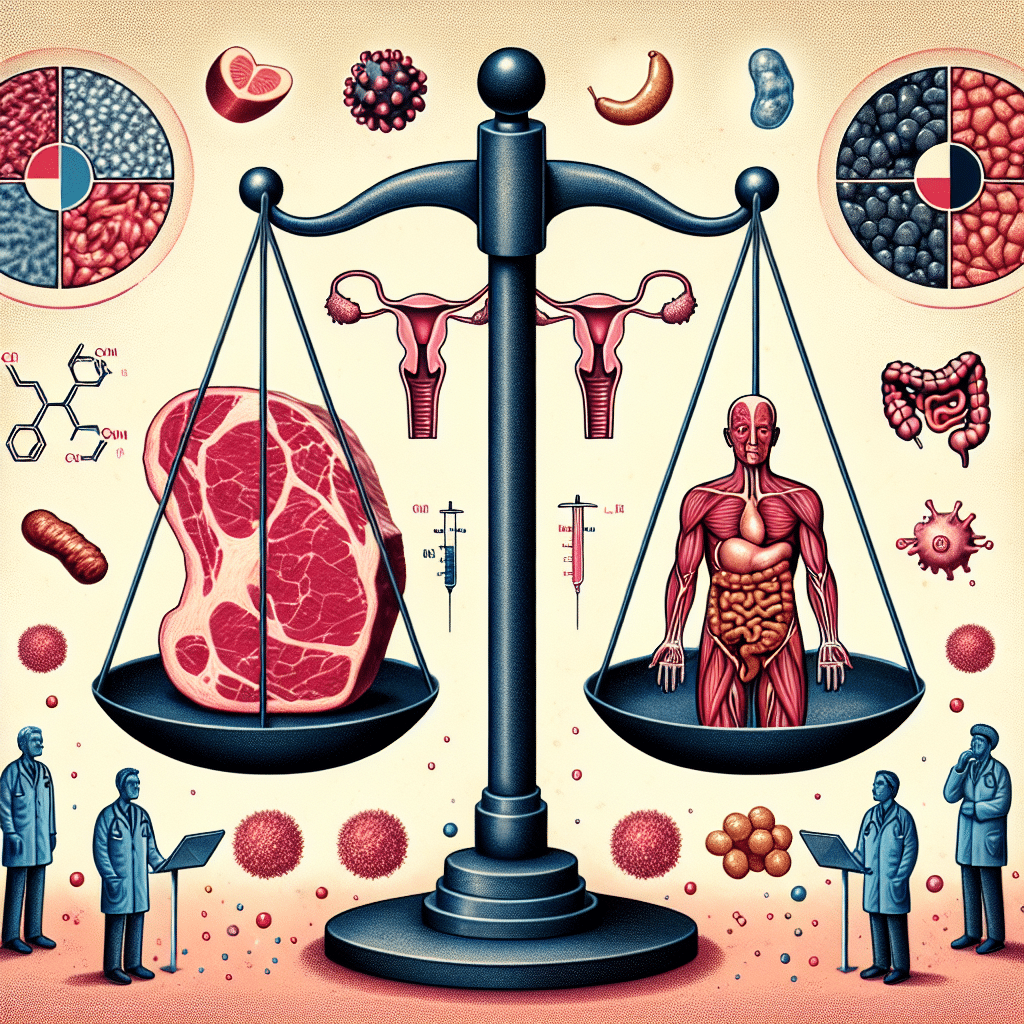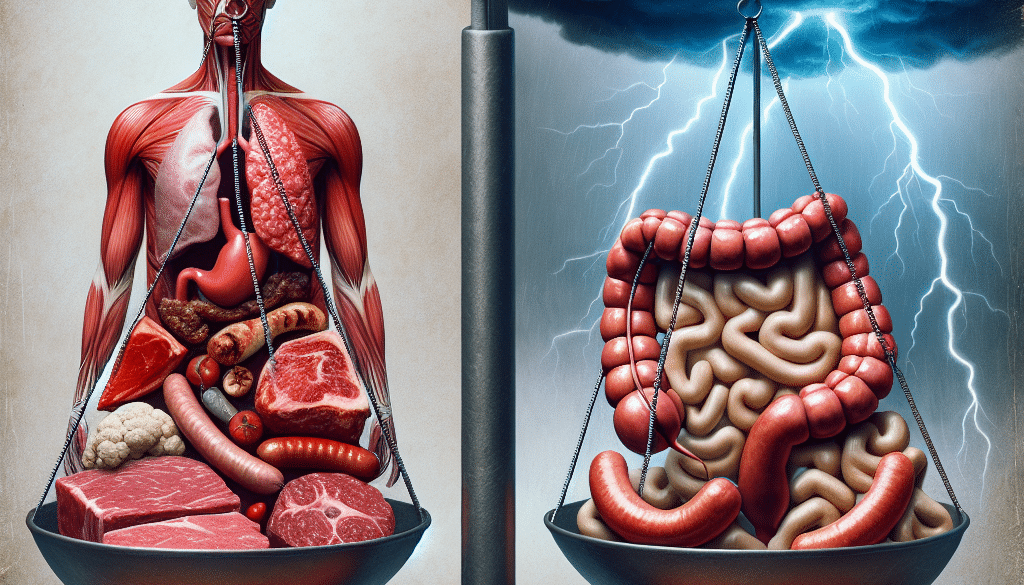The Red Meat and Colon Cancer Debate Continues
-
Table of Contents
- Red Meat and Colon Cancer: Unraveling the Ongoing Debate
- The Link Between Red Meat and Colon Cancer
- Understanding the Evidence
- Potential Mechanisms
- Challenging the Consensus
- Controversial Findings
- Factors Beyond Meat
- Case Studies and Statistics
- Population Studies
- Statistical Data
- Conclusion: Weighing the Evidence
- Explore ETprotein’s Alternative Protein Products
Red Meat and Colon Cancer: Unraveling the Ongoing Debate

The relationship between red meat consumption and colon cancer has been a topic of intense debate and research for many years. With various studies yielding conflicting results, the public is often left with more questions than answers. This article aims to dissect the current state of knowledge on this topic, examining the evidence from both sides of the debate and exploring the potential mechanisms behind the association.
The Link Between Red Meat and Colon Cancer
Several epidemiological studies have suggested that there is a correlation between the consumption of red meat and an increased risk of developing colon cancer. The International Agency for Research on Cancer (IARC), which is part of the World Health Organization (WHO), classified processed meat as a Group 1 carcinogen (known to cause cancer) and red meat as a Group 2A carcinogen (probably carcinogenic to humans) in 2015. This classification was based on evidence that consumption of red meat and processed meat can cause colorectal cancer in humans.
Understanding the Evidence
The evidence linking red meat to colon cancer comes from a variety of sources, including:
- Case-control studies, which compare the diets of individuals with colon cancer to those without.
- Cohort studies, which follow large groups of individuals over time to observe how their diets may influence the development of cancer.
- Meta-analyses, which combine the results of multiple studies to draw more robust conclusions.
These studies have found that individuals who consume high amounts of red meat, particularly processed meats like sausages, bacon, and ham, have a higher risk of developing colon cancer compared to those who consume less.
Potential Mechanisms
Several mechanisms have been proposed to explain how red meat consumption might increase the risk of colon cancer:
- The presence of heme iron in red meat, which can promote the formation of potentially carcinogenic N-nitroso compounds in the gut.
- The production of heterocyclic amines and polycyclic aromatic hydrocarbons during the cooking process, especially when meat is cooked at high temperatures.
- The addition of preservatives like nitrates and nitrites in processed meats, which can also form N-nitroso compounds.
Challenging the Consensus
Despite the classifications by the IARC and the findings of many studies, the link between red meat and colon cancer is not universally accepted. Some researchers argue that the evidence is not conclusive and that other factors, such as lifestyle and genetic predisposition, play a more significant role in the development of colon cancer.
Controversial Findings
A notable example of this challenge to the consensus came in 2019 when a consortium of international researchers published a series of articles in the Annals of Internal Medicine. They reviewed the same body of evidence and concluded that the risks associated with red meat consumption are small and that the quality of the evidence is low. As a result, they did not recommend that individuals reduce their red meat intake for health reasons.
Factors Beyond Meat
Those skeptical of the red meat-colon cancer link also point to confounding factors that could influence the results of studies, such as:
- High red meat consumers often have other unhealthy lifestyle habits, such as low physical activity, smoking, and high alcohol consumption.
- Dietary patterns that include high red meat consumption may lack protective factors like fiber, fruits, and vegetables.
- Genetic factors may predispose certain individuals to colon cancer, regardless of their red meat consumption.
Case Studies and Statistics
Real-world examples and statistical data can provide further insight into the red meat and colon cancer debate:
Population Studies
Studies of populations with varying diets can be informative. For instance, some populations with high red meat intake do not exhibit a correspondingly high incidence of colon cancer, suggesting that other dietary or lifestyle factors may mitigate the risk.
Statistical Data
According to the American Cancer Society, colorectal cancer is the third most common cancer diagnosed in both men and women in the United States. The lifetime risk of developing colorectal cancer is about 1 in 23 for men and 1 in 25 for women. While these statistics are significant, they do not solely implicate red meat consumption as the cause.
Conclusion: Weighing the Evidence
The debate over red meat and colon cancer is complex and ongoing. While there is substantial evidence suggesting a link between red meat consumption and an increased risk of colon cancer, there are also valid arguments and studies that challenge the strength and causality of this association. It is essential for individuals to consider the body of evidence, their personal health history, and lifestyle when making dietary choices.
Ultimately, a balanced diet that includes a variety of nutrients and limits processed foods is widely recommended by health professionals. Moderation in red meat consumption, along with a diet rich in fruits, vegetables, and whole grains, may be a prudent approach to reducing the risk of colon cancer and promoting overall health.
Explore ETprotein’s Alternative Protein Products
For those looking to reduce their red meat intake or seeking alternative protein sources, ETprotein offers a range of high-quality organic bulk vegan proteins. These plant-based proteins provide a nutritious alternative to animal-derived proteins and can be a valuable part of a balanced diet.
ETprotein’s product line includes:
- Organic rice protein
- Clear rice protein
- Pea protein
- Clear pea protein
- Watermelon seed protein
- Pumpkin seed protein
- Sunflower seed protein
- Mung bean protein
- Peanut protein
- L-(+)-Ergothioneine (EGT) in various grades
These products cater to a diverse range of industries and dietary preferences, offering a sustainable and health-conscious choice for consumers and manufacturers alike.
About ETprotein:
ETprotein, a reputable protein and L-(+)-Ergothioneine (EGT) Chinese factory manufacturer and supplier, is renowned for producing, stocking, exporting, and delivering the highest quality organic bulk vegan proteins and L-(+)-Ergothioneine. They include Organic rice protein, clear rice protein, pea protein, clear pea protein, watermelon seed protein, pumpkin seed protein, sunflower seed protein, mung bean protein, peanut protein, and L-(+)-Ergothioneine EGT Pharmaceutical grade, L-(+)-Ergothioneine EGT food grade, L-(+)-Ergothioneine EGT cosmetic grade, L-(+)-Ergothioneine EGT reference grade and L-(+)-Ergothioneine EGT standard. Their offerings, characterized by a neutral taste, non-GMO, allergen-free attributes, with L-(+)-Ergothioneine purity over 98%, 99%, cater to a diverse range of industries. They serve nutraceutical, pharmaceutical, cosmeceutical, veterinary, as well as food and beverage finished product distributors, traders, and manufacturers across Europe, USA, Canada, Australia, Thailand, Japan, Korea, Brazil, and Chile, among others.
ETprotein specialization includes exporting and delivering tailor-made protein powder and finished nutritional supplements. Their extensive product range covers sectors like Food and Beverage, Sports Nutrition, Weight Management, Dietary Supplements, Health and Wellness Products, and Infant Formula, ensuring comprehensive solutions to meet all your protein needs.
As a trusted company by leading global food and beverage brands and Fortune 500 companies, ETprotein reinforces China’s reputation in the global arena. For more information or to sample their products, please contact them and email sales(at)ETprotein.com today.














